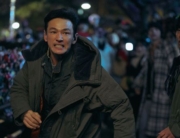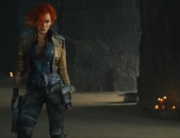Right away you know that Sion Sono—previously of Love Exposure and Cold Fish—isn’t going to play it straight. The Fuck Bombers, a film collective of four high schoolers armed with 8 mm cameras, just want to make movies with lots of action and excitement. Then 10 years goes by, and the group has just a videotaped sample reel to show for their efforts, yet Hirata (Hiroki Hasegawa), the group’s director, still preys to the Movie God, which he worships like a hyperactive puppy.
A concurrent storyline involves Yakuza boss Muto (Jun Kunimara); his daughter Michiko (Fumi Nikaido), the child star of a very popular and catchy toothpaste commercial; and his jilted wife, who kills a bunch of her husband’s rival yakuza and is sent to prison for 10 years. (You might remember Kunimara from Kill Bill Vol. 1 and Ichi the Killer; he’s a go-to guy to play crime bosses.)
Ten years later, the grown-up Michiko tries to become an actress, the Yakuza gangs continue to fight, and Muto tries his hand at something different while his imprisoned wife is away: filmmaking. He’s convinced his wife that their daughter is now a movie star, and after she’s out she’s out of jail in 10 days, mama wants to see Michiko on screen. So, how putting the starlet in a movie? Why not make a movie about the sort of thing people go to the movies to see? Rival yakuza battle time! But who will shoot it? Hmmm….
Why Don’t You Play in Hell starts off like a Japanese rip-off of early Guy Ritchie (think of the hyper-kinetic editing and comic riffs of Snatch, especially in the early scenes). Sono had his own film collective around the time of his 1991 debut, actually called the same moniker as in this film, so this movie is meant to be as wild a satire as can be, with all of the characters usually talking and acting like they’re in a parody. Even Kunimara, who is what Leslie Nielsen is to a Zucker brothers production, is serious, though he still seems to get the big goof.
The problem is that it takes a while to get to the blood and mayhem, more than 90 minutes for the setup alone. Still, it’s all about the laughs. The first half has a couple of them, but it’s mostly amusing. The performances are just so BIG, and nobody dials it back, so that the comedy at first just comes off as Sono and company trying too hard.
But as soon as the eager Hirata inevitably finds out what kind of movie he’s been roped into making, Hell really takes off. Then it becomes a blood-soaked cartoon, and it’s all the better for it. The climax is one of those meta commentaries on violent movies, short of a ridiculous, Troma-type blood-soaked world. It’s still bloody (albeit with CGI blood, the biggest flaw in the climax), and the energy and mania never lets up. In other words, it’s (finally) a blast.
I really get charged when a movie takes off, and this one becomes completely lovable as a wild tribute to cinema and filmmaking. In addition, the Bombers shoot in 35 mm, the preferred choice for what Hirata sees as a must for “real” filmmakers—and it made me want to love the movie more. It has too much pace-setting music at times, too much hambone Japanese yakuza, and yet it’s all of a piece. It’s about, at its best, the joy of the movies.







Leave A Comment